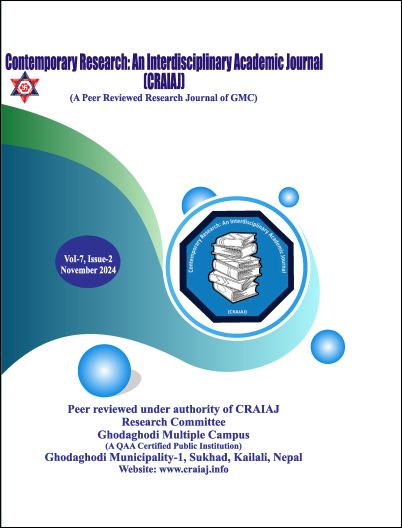Exploring Feedback Mechanisms in Higher Educational Governance: Learning from a Case Study
DOI:
https://doi.org/10.3126/craiaj.v7i2.72166Keywords:
Educational governance, evaluation system, feedback mechanism, pedagogical practicesAbstract
Feedback mechanisms are critical elements of an institution's educational governance. This paper aims to explore the role of feedback mechanisms in the context of educational governance within the higher education system on campus. Utilizing a descriptive research design that incorporates a case study approach, the researchers identified four faculty members, and three non-teaching staff members as key informants, through purposive sampling. Additionally, 50 students from various programs across the three faculties and 42 corresponding guardians were selected as respondents using a random sampling method. Questionnaires, interview schedules, and non-participant observation forms were the basic tools for data collection. The researchers employed program theory as a theoretical framework. The research underscores the essential function of constructive feedback in improving educational results and emphasizes the necessity of incorporating stakeholder viewpoints into governance frameworks. A lack of a strong and effective feedback system is apparent in the educational governance at campus, particularly in relation to curriculum design, teaching methods, assessment systems, and services. This paper posits that feedback mechanisms are fundamental to ensuring quality education within the institution. It is imperative for campus administration to actively oversee and deliver feedback to the relevant educators, rather than solely to the teaching staff and students.
Downloads
Downloads
Published
How to Cite
Issue
Section
License
Copyright (c) 2024 Ghodaghodi Multiple Campus, CRAIAJ

This work is licensed under a Creative Commons Attribution-NonCommercial-NoDerivatives 4.0 International License.
© Ghodaghodi Multiple Campus, Research Committee, RMC

This work is licensed under a Creative Commons Attribution-NonCommercial-NoDerivatives 4.0 International License. This license enables reusers to copy and distribute the material in any medium or format in unadapted form only, for noncommercial purposes only, and only so long as attribution is given to the creator.




